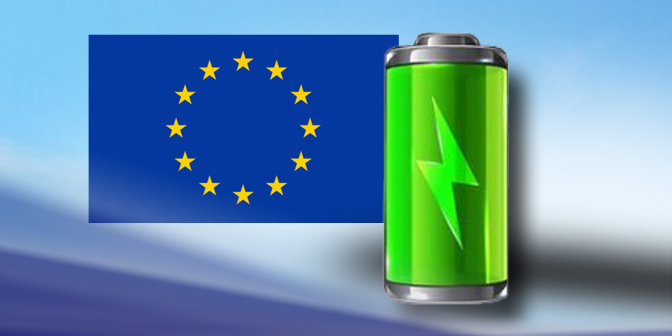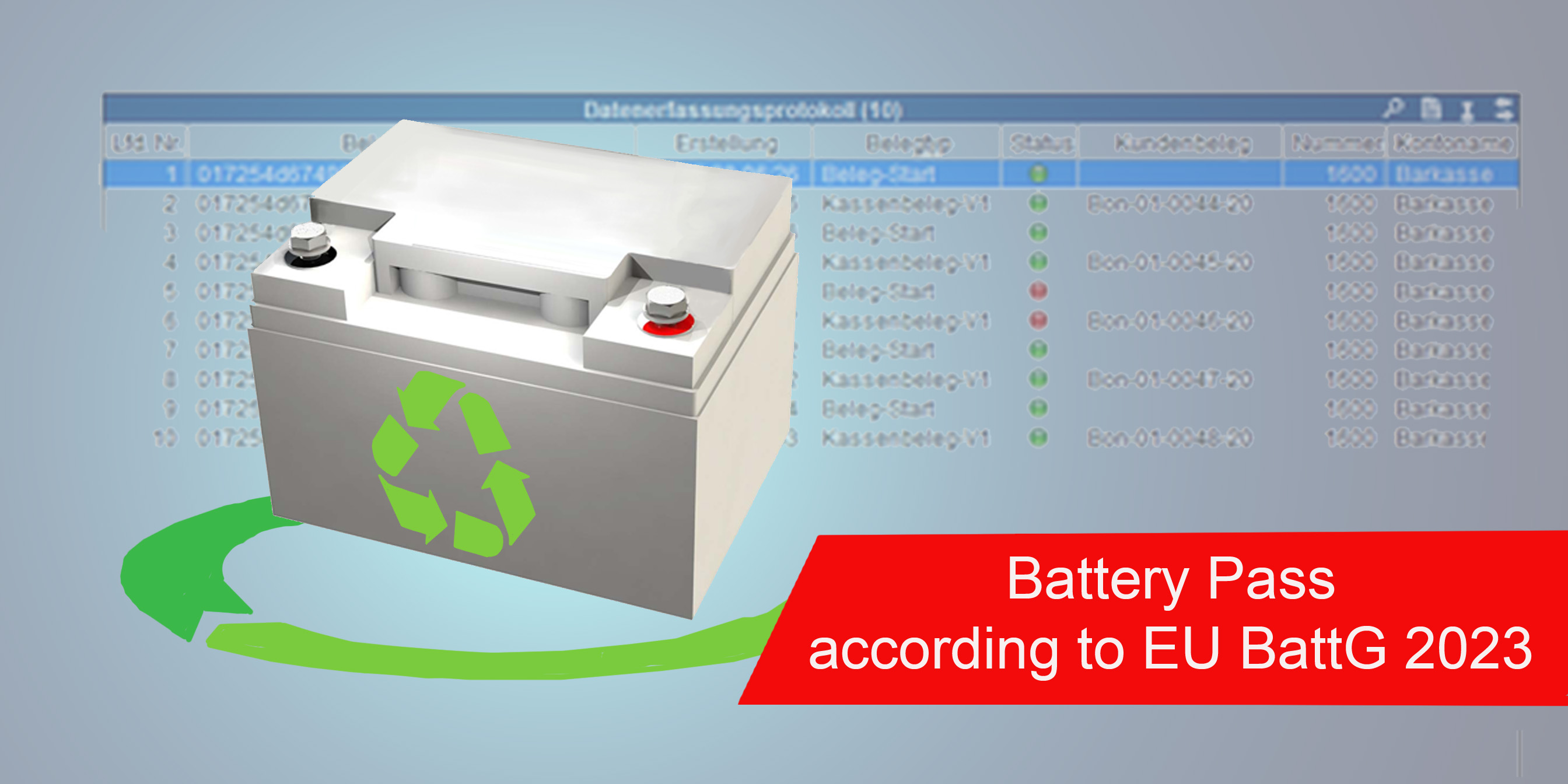EU Battery Regulation 2024

This article describes the difference between the EU draft law from 2021 and today's EU regulation “EU BattG 2024”, which has become law, with regard to the GENEREX products BACS, SMARTBATTERY and SMARTLOGGER.
Pressure is increasing at EU level to combat the waste of resources and the associated environmental pollution. Where you can see this particularly well is the EU's new battery regulation. From a battery manufacturer's perspective, the EU requires annoying documentation work and the industry has been hiring consultants on its own behalf for years, whose only purpose is to influence the EU as a "lobbyist" and to make the legislation "practical" for the industry. This is a common “fate” of such initially ambitious EU legislative proposals - in the end, only a small part is actually implemented. But especially within the booming battery industry, a lot could be done to prevent energy and resource waste; significant savings are possible in both recycling and energy efficiency. After the “voluntary declarations of commitment” in the previous EU drafts of the Battery Act did not take effect, the EU, after years of announcement, has massively increased the pressure with the 2021 draft - only to now take the pressure off again after the moment of shock from the EU battery industry and its lobby reaction. If the suppliers and importers of battery-supported systems such as UPS systems were forced to introduce monitoring and management systems via a battery regulation, the EU importers would mainly be those affected and not the actual causes of the environmental damage from Asia. The lobby at the EU was therefore able to negotiate massive changes to the battery regulation - and thereby gained time for the EU battery industry to begin catching up.
So for our customers in advance: All clear! Most of you are “off the hook”.
But as a manufacturer you should now prepare yourself for where the EU is heading.
The path to the EU Battery Act 2024 (EU BattG 2024)
The updated EU guidelines on batteries were proposed for the first time in 2019 in EU Regulation No. 2019/1020. In the following link (from our 2022 newsletter) you can read that GENEREX already met the EU's requirements with our products in detail.
Link to Newsletter 2022:
Regulation of the European Parliament and of the Council Generex
BACS, SMARTBATTERY & SMARTLOGGER already meet all the requirements of the EU draft from 2021
The geopolitical and economic disaster reports since 2019 have followed one another continuously - corona pandemic, delivery bottlenecks, inflation, the beginning of the global economic crisis, Russia's attack on its neighbors, Cold War 2.0, ... it’s been somewhat grim. One can also speak of a “turning point” for our market: the market for our products has become highly “politicized” and now distinguishes between countries and economies as “friend” and “enemy”.

GENEREX has always focused on the Western world and avoided becoming dependent on non-EU/non-US based suppliers. Today it seems to us that this strategy is being positively recognized by customers from Western countries for the first time. “Made in EU, Made in USA” is still our long-term strategy and has made us number 1 on the market for battery management systems in the industry.
Therefore, we are not particularly sad that the new EU law 2024 has not (yet) made the extremely progressive ideas from 2021 into law.
The time saved for the UPS and battery industry is also a win for us - we can prepare together with our customers for the tightening of EU law that is sure to come and offer the greatest technical basis to meet these requirements - in order to protect their products against the aggressive Enhance competition from Asia!
The new, official regulation can be found in its entirety and in all EU languages here: https://eur-lex.europa.eu/eli/reg/2023/1542/oj
Wind turbines, generators, emergency power systems - wherever batteries are used stationary - can continue as before in compliance with the law, as one of the most important measures proposed jas not ultimately “made the cut”: The mandatory introduction of a battery management system for almost all battery groups, which should lead to sustainable management and resource conservation, has been reduced to “batteries in automotive or storage systems”.
Important for our EU customers and conclusion : “Stationary UPS systems” have been completely removed from responsibility!
What significance does a BMS still have in the EU BattG?
Both versions of the regulation (the one proposed in 2021 and the regulation that came into force as law in 2024) contain a summarized definition for the term "battery management system", with the focus from 2024 clearly only on the "influence" of a BMS for certain applications (only for batteries in the automotive and storage sectors) and the protection of the public power grid.
A BMS is only required for batteries that are regularly operated on public or private power grids- and therefore almost only affects electric cars that already have a BMS on board.
There are additional regulations at EU level for electric cars: Regulation (EU) 2019/944 on alternative fuels infrastructure Article 13: Smart metering systems, Article 14: Interoperability of smart metering systems, Article 15: Access to data from smart metering systems. Directive (EU) 2012/27/EU on energy efficiency Article 9a: Introduction of smart metering systems, Article 10: Interoperability of smart metering systems, Article 11: Access to data from smart metering systems, etc. - this list is still long - but the effect is, that the greatest electricity loads from electric vehicles were initially the responsibility of the operators of the power grids and the problems with the batteries were blamed on the end user.
As you can see, the obligations of the new EU law with this relaxation are now primarily aimed at the end users of batteries if you compare the 2021 draft with the text of the law for 2024:
OLD: Battery Ordinance 2021
Article 2(1)(c):
UPS systems were included in the definition of “equipment”.Appendix I:
UPS systems were included in the list of devices covered by the battery regulation.
New: Battery Ordinance 2024
Article 2(1)(c):
UPS systems are no longer included in the definition of “equipment”.Appendix I:
UPS systems are no longer included in the list of devices covered by the Battery Regulation.
The EU explains the reason for removing UPS applications from the 2024 Battery Regulation “The European Commission has found that UPS systems are already covered by other legislation, such as: B. Directive 2006/95/EC (Low Voltage Directive) and are therefore sufficiently regulated.
The new wording in the EU Battery Act 2024 can be legally understood to mean that only the end user or operator of batteries is under massive pressure to act. But even if such an interpretation is not accepted, there are plenty of “exemptions” for the manufacturer, defined in Article 12(4) and Article 9(1).
"The competent authority may authorize exceptions to the requirements ... if it considers this to be justified and the proper disposal of batteries and battery waste is otherwise ensured."
"Battery and battery cell manufacturers shall ensure that the batteries and battery cells they place on the market are designed, manufactured and tested in such a way that, under normal operating conditions, they do not pose a risk to the health and safety of people and do not pose an unreasonable burden on the environment."
Nevertheless - even if only the end user currently has a problem with the EU BattG 2024, the matter will still be interesting for manufacturers: end users’ “problems” can quickly become a lucrative market!
The obligations for end users and manufacturers in detail:
According to the Battery Regulation, the obligations of the operator/end user are defined in Articles 15 and 17:
The operator must collect data on the consumption, disposal and return of the batteries.
BACS and SMARTLOGGER / SMARTBATTERY can both provide this data, especially the retrofittable SMARTLOGGER makes any battery application EU compliant within seconds!

However, while battery manufacturers do not escape completely unscathed from this obligation, it will be much easier than first feared: The battery manufacturer's obligations are defined in Articles 9, 10 and 11:
The manufacturer must collect data on the chemical composition, performance, durability and safety of batteries and make this data available to the EU and consumers.
The SMARTLOGGER would also be ideally suited to making these technical data of the battery available, in particular the EU's requirement for the introduction of a “battery passport” that contains all technical information, warnings, date of manufacture, anonymous and encrypted transmission of data in accordance with GDPR and ultimately verifiable deletion The SMARTLOGGER / SMARTBATTERY already provides data for disposal and can be read out at any time!
Complete documentation from the “cradle to the grave” – i.e. from battery production to disposal – requires a “black box” like the SMARTLOGGER or SMARTBATTERY.
The "double benefit" of long-term battery monitoring ensures considerably higher customer acceptance than a simple EU battery passport, which actually only serves the EU requirement for data. Since both require a certain minimum level of electronics, the SMARTLOGGER is a more efficient solution than a simple battery passport.
The EU's requirement to monitor and log battery usage in the future is such an attractive market that GENEREX has targeted its products accordingly!
Back to
Next Article